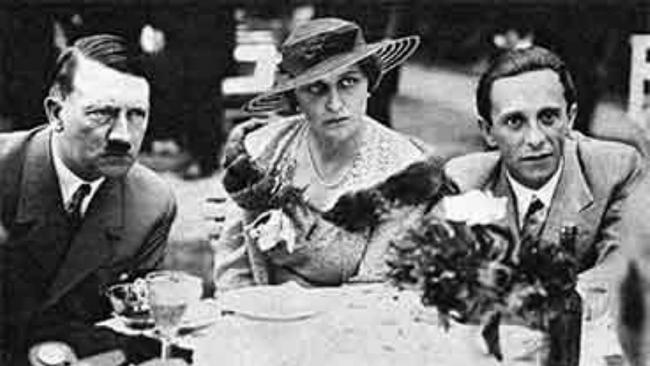Film seeks to ‘humanise’ Adolf Hitler and his evil propaganda chief Joseph Goebbels
Spin was not simply a cosmetic feature of the regime. It was at the heart of its decisions – even shaping its military strategy.

“Once we propagandists used to work for the military,” Joseph Goebbels says in Fuhrer und Verfuhrer (or Goebbels and the Fuhrer in English). “Now the military works for us.”
This is one of the later scenes in the docudrama that aims to “rip the mask off” Third Reich propaganda.
The film, which opened in German cinemas last week, shows that spin was not simply a cosmetic feature of the regime. It was at the heart of its decisions, even shaping military strategy towards the end of World War II. When an underling dares to point out that Hitler’s hand is trembling in footage shot for a newsreel, Goebbels snaps: “True? I decide what is true.”
Propaganda permeates every aspect of Nazi life, from Goebbels’s prolific seductions of women to his attempts to influence Hitler’s decisions, including a staged balcony appearance in front of only a few people waving swastika flags, which is intended to underline the lack of public support for the war.
Professor Thomas Weber, of the University of Aberdeen, who was the chief historical consultant on the film, says: “Basically, we wanted to show how all those images that we still have in our heads of the Third Reich are ultimately based on how Hitler and Goebbels wanted to be seen.
“In a way, they are still orchestrating from their graves how we see the Third Reich, even if our interpretation of it has been turned upside down.”
Unusually for a German film about the Nazi era, Fuhrer und Verfuhrer is narrated largely from the standpoints of Goebbels and Hitler, which inevitably humanises both men to a certain extent.
The drama begins with a crackly archive recording of a soft-spoken voice. The words “Do you know who’s speaking?” flash up on the screen. It is Hitler – but not as most Germans know him.
It is the only surviving recording of the dictator speaking unguardedly in a private setting, secretly taped by the Finns at a conference in 1942.
Hitler is shown playing with the latest Goebbels baby while charming Eva Braun, his companion, and Goebbels’s wife, Magda, with patronising gallantry.
Goebbels is portrayed in anguish over the enforced separation from one of his lovers, Czech actor Lida Baarova. He sings Silent Night with his family around the Christmas tree while trying in vain to persuade Hitler to call off the impending war – not so much because he thinks it is morally wrong as because he believes the German public is not ready.
This “perspective of the perpetrators” is still uncomfortable territory in Germany, although it is balanced by several interviews with survivors of the Holocaust.
The most prominent among them is Margot Friedlander, 102, who was liberated from the Theresienstadt concentration camp by the Red Army but whose family members were murdered in Auschwitz.
The project initially struggled to get funding because of longstanding concerns that concentrating on Hitler and Goebbels might risk letting ordinary Germans off the hook.
Weber says, however, that attitudes are beginning to change, particularly against the backdrop of Russian aggression and a resurgent radical right in Germany.
“There is in German society this great urge to figure out what is the role of demagoguery and disinformation,” he says.
“The whole point is we have to humanise Hitler, precisely because he was not some kind of demon. He was a human being who did terrible things.
“In a way it becomes scarier when Hitler is human because when you see the Aperol spritz-drinking new radical right you realise that they are not really that different from National Socialism.”
The mould was broken 20 years ago by Downfall, in which Bruno Ganz’s occasionally gentle portrayal of Hitler, based on the same Finnish recording, unsettled some German audiences.
But Fuhrer und Verfuhrer goes further, following Hitler and Goebbels from 1938 to their suicides in 1945, exposing their private lives, their moments of doubt and hesitation.
The film has generally been well received. The conservative daily newspaper Die Welt said it was “revolutionary” and praised Austrian actor Fritz Karl, 56, for “lending Hitler the humanity that makes him a monster in the first place”.
Der Spiegel, the leading news magazine, was less convinced, complaining that the Germans came across as victims of the regime’s manipulations rather than enthusiastic collaborators.
The Times



To join the conversation, please log in. Don't have an account? Register
Join the conversation, you are commenting as Logout